Defining Politics: Knowing What We Are Talking About Could Save Our Lives
If we are going to have fruitful conversations, where we actually learn from one another and move toward a more secure, prosperous and harmonious society, then I think, at a minimum, we need to KNOW WHAT WE ARE TALKING ABOUT

’Tis the season once again when the people of middle North America spend extraordinary amounts of their time in political discussions. Despite all the awkwardness and frustration that ensues, it seems almost everyone is after pretty much the same thing: a better, safer, kinder world. Most people want others to have sufficient income, better education, access to healthcare, and freedom from hunger, war and tyranny. They just don’t agree on how to accomplish it.

Adding to the alienation people tend to experience is the fact that we don’t even have a clear definition of the terms we use to discuss these hot topics. Among the front-running U.S. presidential candidates, Bernie Sanders is a self-proclaimed Socialist — an Independent Social Democrat — while Donald Trump was a Democrat turned conservative Republican capitalist. Rand Paul is a Libertarian turned Republican. Progressive used to mean Conservative; Conservatives used to call themselves Liberals; Liberal used to mean what Libertarian means today and now the Neo-Cons are called neo-liberals. What in the world do these terms really mean?
If we are going to have fruitful conversations, where we actually learn from one another and move toward a more secure, prosperous and harmonious society, then I think, at a minimum, we need to KNOW WHAT WE ARE TALKING ABOUT.
If I am an electrician, I better know the difference between ohms, watts and volts, and between a hot wire and a cold one. If I am going to talk about religion and theology, I should be prepared to share and defend my definition of “God.” If I want to be effective in navigating to a better world with people who are engaged in the political process, then common sense and intellectual rigor would require that I at least know what the key terms mean that I am using. This isn’t just semantics. There is extensive historical context to these terms that warrants our attention.
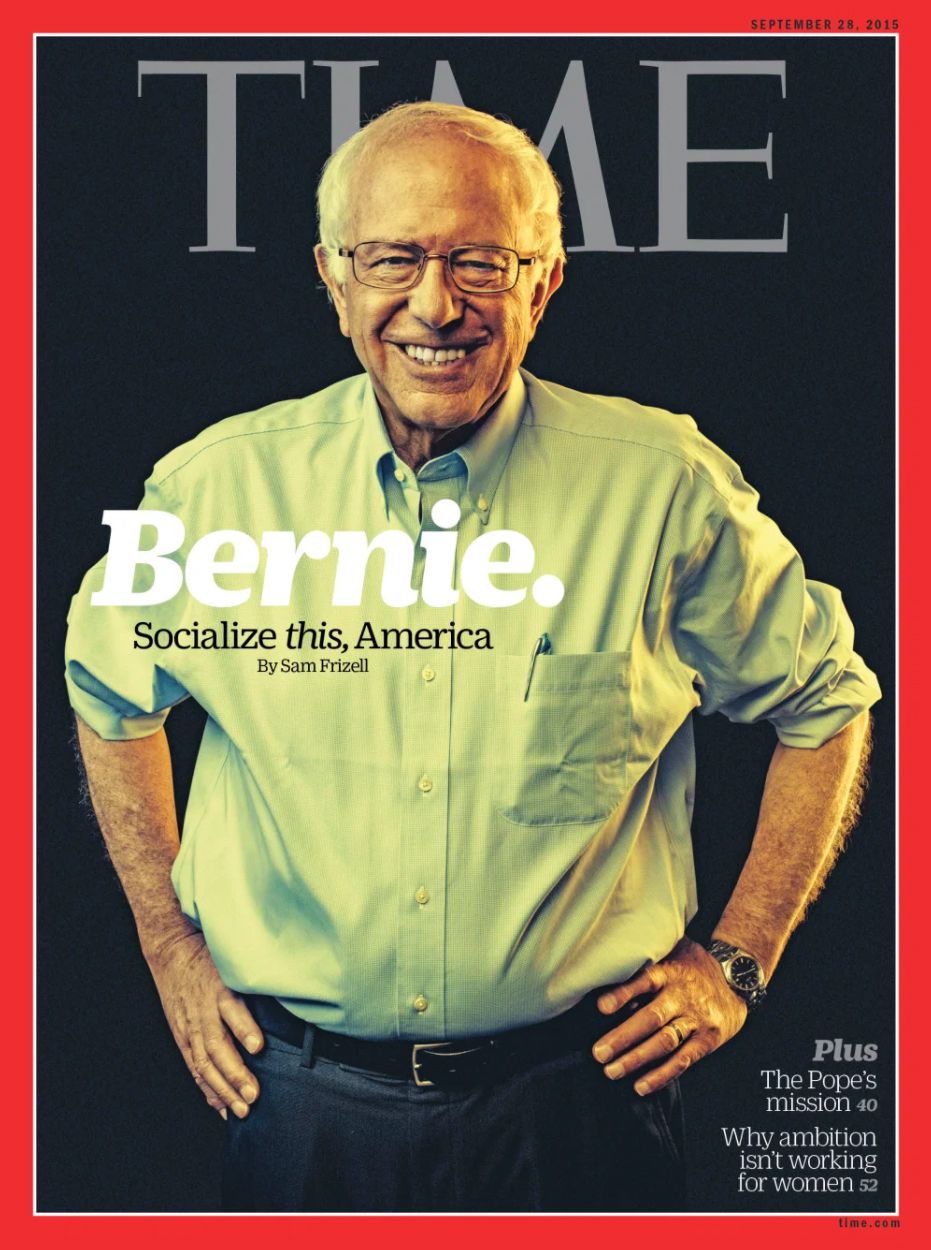
The September 2015 issue of TIME Magazine ran a cover with Bernie Sanders saying “Socialize this, America.”
The NATION magazine has become increasingly bold in 2015, encouraging readers to get beyond their embarrassment, their fears of social rejection and just take a stand in proclaiming themselves as Socialists. Socialist politicians are being elected around the world. So let’s start there.
Socialism
“Any and various economic and political theories advocating collective or governmental ownership and administration of the means of production and distribution of goods.”
(Webster’s Dictionary)
With Socialism, the government has complete control over the creation and distribution of money, education, transportation, health care (including the right to impose mandatory vaccines — which Bernie Sanders supports) — and everything in between.
Given that over half of Americans are now overtly dependent on government welfare programs, and even more rely on the government for jobs, contracts, subsidies, education and health care, it is understandable that it would seem compassionate to want to empower the state to give and do more. On the surface, socialism can sound like a benevolent way to balance income inequality — which is certainly and painfully way out of whack. I have recently asked many people what their working definition of Socialism is, and the most common answer is, “When the government actually takes care of the people.” Perhaps that’s why now some 43% of U.S. 18–29 year olds say Socialism is OK.
These conversations are in part what inspired this blog, because I see and know so many people who want to express their compassion by expanding government power, even though the history of Socialism is the opposite of good for “the people”.
I share the goals of wanting everyone to have the opportunity to create prosperity and to feel healthy and secure, but I have zero confidence that Socialism could ever achieve that. Why? Because when a group of people has the power to grant us what we need, they also have the power to take it away. In fact government can only give what it has already taken. They have done so repeatedly throughout history under Socialism. When, you might ask?
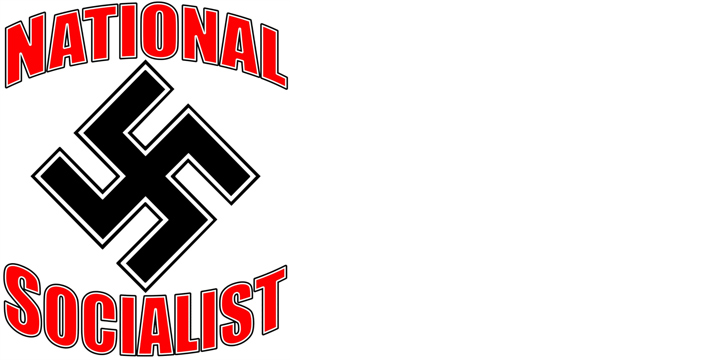
GERMANY
Adolf Hitler was democratically elected by a landslide in a time of economic crisis and his party, the National SOCIALISTS (“Nazis”), went on to thoroughly inflate and destroy the economy of Germany and to wreak havoc on millions of lives through genocide and war.
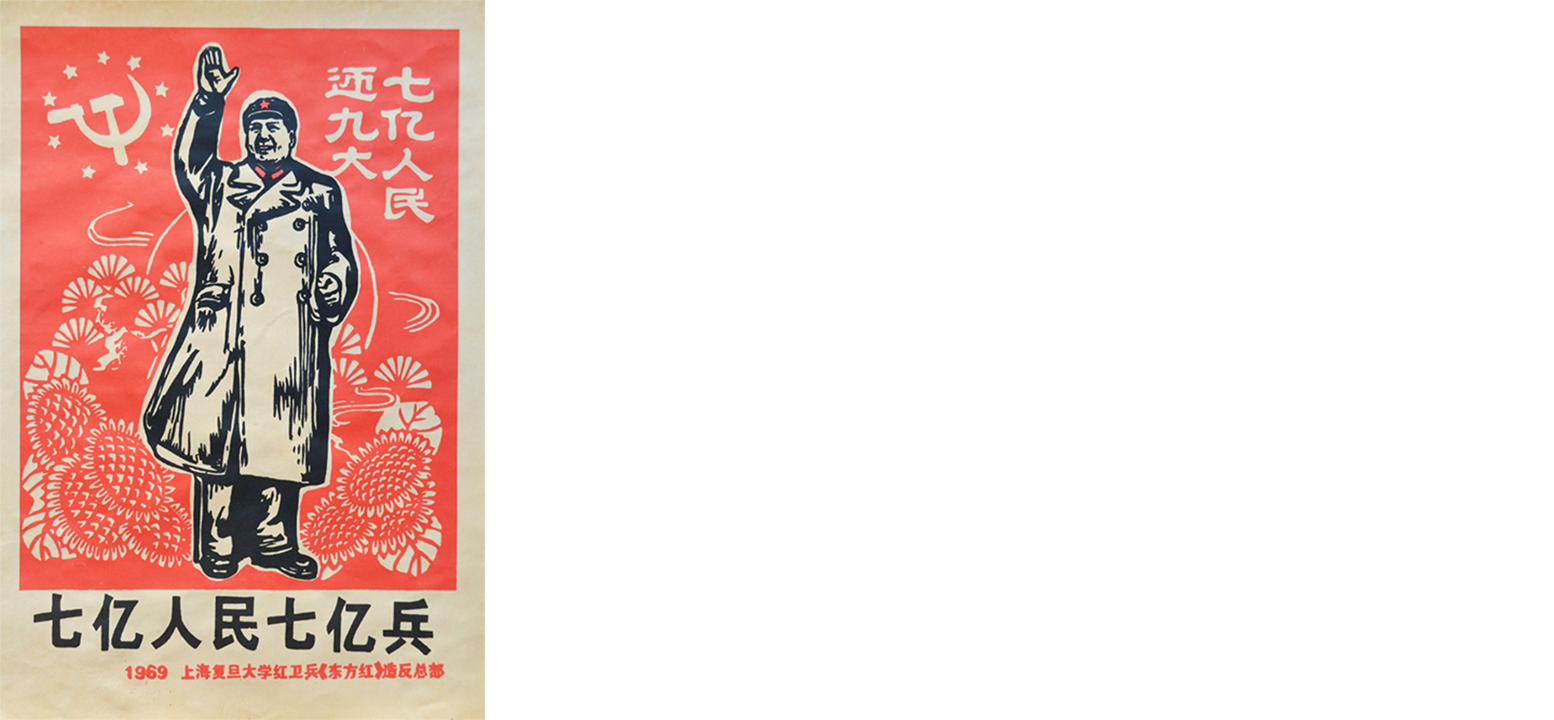
CHINA
Chairman Mao was treated like a deity as he decreed the “Great Leap Forward” of “socializing” the Chinese people. He stated in his “Little Red Book” manifesto that the socializing of the nation was the necessary preparation for Communism.
The result of that “social experiment” was rampant poverty, hunger and over 65 million Chinese people killed … during “peacetime.”
Remember, globalist David Rockefeller, one of the main architects of the “New International Economic Order”, said of this regime, “The social experiment in China under Chairman Mao’s Leadership is one of the most important and successful in human history.”
This scenario is not unique to China.
USSR
The Union of Soviet SOCIALIST Republics (USSR) was also socialized by Marxism into Leninist/Stalinist Communism. This was a dramatic failure economically and socially. Approximately 20 million of their own people were murdered by this regime.
“Those who cannot remember the past are condemned to repeat it.”— George Santayana
VENEZUELA
Hugo Chavez was wildly popular in Venezuela for kicking out corrupt foreign corporations that were polluting the water, land and air, and raping the economy. But his solution was a Socialist regime that put the resources and economy into the centralized planning of the authoritarian state. It helped many people for a short while and then led to economic disaster as centralized planning always has, and always will.
Socialists are being elected all over the world. The UK recently elected Jeremy Corbyn as the new head of the Labour Party. It’s Hollande in France, Turnbull in Australia and Trudeau in Canada. Greece voted in the Syriza party — again — on the strength of their commitment to walk away from the corrupt international banker loans, even though they did not. What was lost in the panic was an understanding that this was a Communist party and Communism has always led to financial ruin and severe human suffering and death.
Socialism does not do anything to right the sinking ship of central banking, fiat money and fractional reserve counterfeiting, government subsidies, rigged interest rates and markets, wars, or bailouts, etc. And while people like Bernie Sanders often point to Denmark and Sweden as positive examples, their ranking on economic prosperity per person in these countries has declined from the top 5 to numbers 15 and 14 respectively, since they abandoned the entrepreneurship of the free market and turned to Socialism. People in these countries have extremely high taxes and little or no choice over the kind of medicine or doctor they can access, nor how long it will take to get the care they need. If the government wants to impose mandatory vaccination, for instance, they have the “legal” right to do so. I certainly want everyone to have the best care they can possibly get, but there is no evidence that a socialist government is the way to achieve that.
Another term Bernie Sanders uses for himself is “Social Democrat.”
Social Democracy
“a political ideology that supports economic and social interventions to promote social justice within the framework of a capitalist economy, and a policy regime involving welfare state provisions, collective bargaining arrangements, regulation of the economy in the general interest, redistribution of income and wealth, and a commitment to representative democracy.” (Wikipedia)
It can sound so good! But what exactly are “economic and social interventions” that Social Democrats are authorized to impose? How are they funded? Who is in charge of them? What happens to individual rights? Why exactly would America have a different outcome than every other country that has gone this route? These are not small considerations.
If historically being a Social Democrat is the entrée to Socialism and Socialism is the slippery slope into Communism, how do you feel about Communism?
Communism
“Advocacy of a classless society in which private ownership has been abolished and the means of production and subsistence belong to the community.”
(World English Dictionary)
While communism maintains the ideal of a “classless society” — including the eventual withering away of “the state” — in practice this has never happened. Instead, with communism, everything people need to survive is controlled by the elite rulers who make up “the state”. There is no private property, and there are no individual rights. The authorities can do anything they deem appropriate if it serves their self-defined needs. History proves that under Communism, there is ultimately little or no religious freedom and people in government can even “disappear” (to “Gulag” concentration camps) and murder citizens with impunity.
What does it mean to have the means of production and subsistence “belong to the community?” Community, like “government” or “we the people” is a misleading abstraction. What is community if people have no individual rights? Is it a slave population whose fate is determined by the elite rulers? According to history, the answer is Yes.
Under “Fascist” rule, it’s slightly different.
Fascism
"A governmental system led by a dictator having complete power, forcibly suppressing opposition and criticism, regimenting all industry, commerce, etc., and emphasizing an aggressive nationalism and often racism." (Merriam-Webster Dictionary)
The state does not necessarily demand ownership of the means of production, nor does Fascism even pretend to be committed to economic equality. Italian dictator Benito Mussolini said,
“Fascism should more appropriately be called Corporatism because it is the merging of state and corporate power.” — Benito Mussolini
He was against state ownership of the means of production, because he knew that didn’t work. Mussolini went on to say,
“State ownership! It leads only to absurd and monstrous conclusions; state ownership means state monopoly, concentrated in the hands of one party and its adherents, and that state brings only ruin and bankruptcy to all.” — Benito Mussolini
Mussolini was perceptive enough to realize that to optimize his “power over” he would need to exploit the creativity, productivity and prosperity of business enterprises, but create a forced marriage between them and the political/military power of the government…with himself in charge of it all.
Now traditionally the light at the end of the tunnel — the beacon on the hill — is said to be “Democracy,” so isn’t that what lifts us above the manipulations and domination of authoritarian rule?
Clearly, Democracy represents a great leap forward from other forms of authoritarian rule. What exactly is Democracy?

Democracy
"Government by the people; especially rule of the majority; a government in which the supreme power is vested in the people and exercised by them directly or indirectly through a system of representation usually involving periodically held free elections."
(Merriam Webster)
Government “by the people” does not, of course, mean all people. As the definition makes clear, in its pure form, it means the rule of the majority. That means 49% of a population can feel and be unrepresented at any time. It also means that 49% can be forced to abide by laws that others have imposed. The seeds of revolution are always present, as history has also demonstrated that people will not stand for being coerced into obeisance for long. It is an improvement over other forms of government, but that doesn’t mean it’s the best we can do.
To the surprise of most Americans, the Declaration of Independence and the Constitution don’t mention democracy.
Many “patriots” say that we need to “get the Republic back.” So what is a “republic”?
Republic
- a state in which the supreme power rests in the body of citizens entitled to vote and is exercised by representatives chosen directly or indirectly by them.
- *a state in which the head of government is not a monarch or other hereditary head of state. *
(dictionary.com)
I agree that when there is no anointed king figure that’s a better start, but as soon as we give the government the power to use the funds from our labor to rule over us as they please, the seeds of tyranny are sown once again. Every government in human history has used taxes to grow itself at the expense of the well-being of the citizens. That is a fact. Just how long did our “republic” last? And how do you think folks feel under the boot of the REPUBLIC of North Korea? I have already spoken of the abuses of the Union of Soviet Socialist REPUBLICS.
Here is a key insight that usually goes unnoticed. All “regimes” whether left, right or center, are about consolidating, growing and protecting the power they have taken from others. So whether the rulers are Socialists, Communists or Fascists, Republicans or Democrats, Labour or Tories, Conservatives or Liberals, they are all veering into Totalitarianism.
All “regimes” whether left, right or center, are about consolidating, growing and protecting the power they have taken from others.
Totalitarianism
"a centralized government that does not tolerate parties of differing opinion and that exercises dictatorial control (emphasis mine) over many aspects of life.”
(dictionary.com)
I truly believe that most people who adopt any one of these ideologies are seeking a better world. And I can understand why people are so excited about Bernie Sanders, the longest term “Independent” in the history of the Senate. He’s against Wall Street corruption, the Keystone XL Pipeline and the Trans Pacific Partnership (TPP). Moreover, he wants to not only right the wrongs, but to guarantee that everyone has access to education and healthcare, reduce wealth disparity, and more — “for free.” Virtually everyone I know thinks we need improvements in all those areas, and I agree. But putting the power to impose that, from a centralized authority, has never ultimately met the needs of people. Never. Because at the heart of that authority lies the initiation of force — and with that comes the jackboot of tyranny.
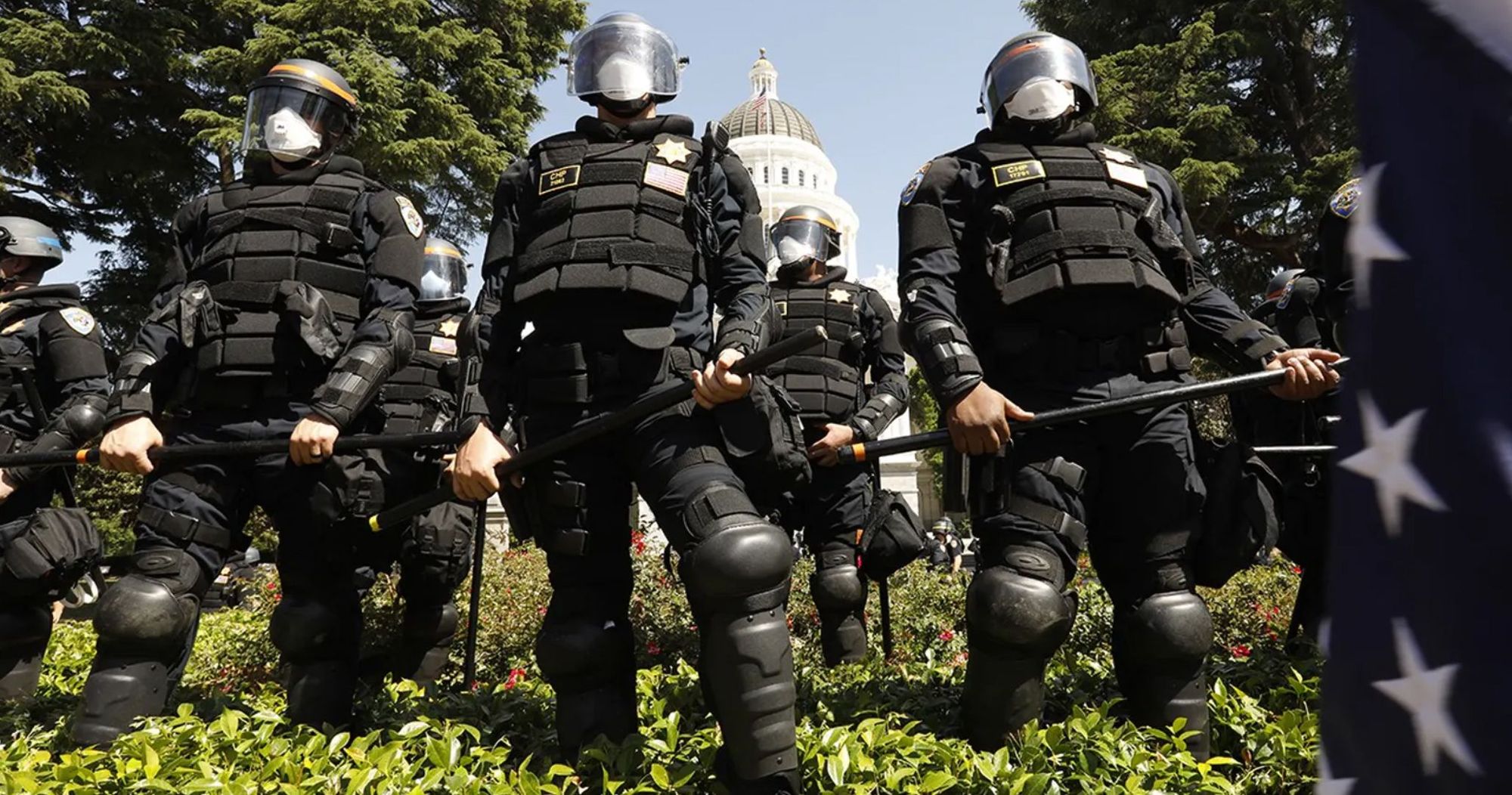
Tyranny
"arbitrary or unrestrained exercise of power; despotic abuse of authority."
So whether it’s from Sanders, Trump, Carson, Paul, Clinton, Bush or any of the others, it is truly helpful when someone does an effective job of exposing unethical behavior and the failures of current systems and regimes. But to think critically enough to actually move toward a thriving world, we need to resist rushing into a blind leap of faith in saying, “I like what he/she is against, so I am going to vote for that one!” We need to pause and say, “So, given what they are EXposing, what are they actually PROposing we DO about these issues, how has it worked before, and who gets violated in the process?”
Even a cursory look at history will show that all regimes become corrupt and fail. And when finally overthrown, they have been replaced by what? A new corrupt regime that has always ultimately failed! America has only existed for a little over 200 years and the early relative freedom and prosperity (of white people) has careened steadily toward tyranny. Now American citizens are increasingly waking up to realize that most are poor, sick, afraid, confused and increasingly surrounded, surveilled and threatened by the growing government and its emerging police state.
“Insanity: doing the same thing over and over again and expecting different results.” — Albert Einstein
This is not to say that we have not made progress. Undoubtedly we have come a long way from the rule of Pharoahs, Kings, feudal lords and dictators. As Martin Luther King Jr. said,
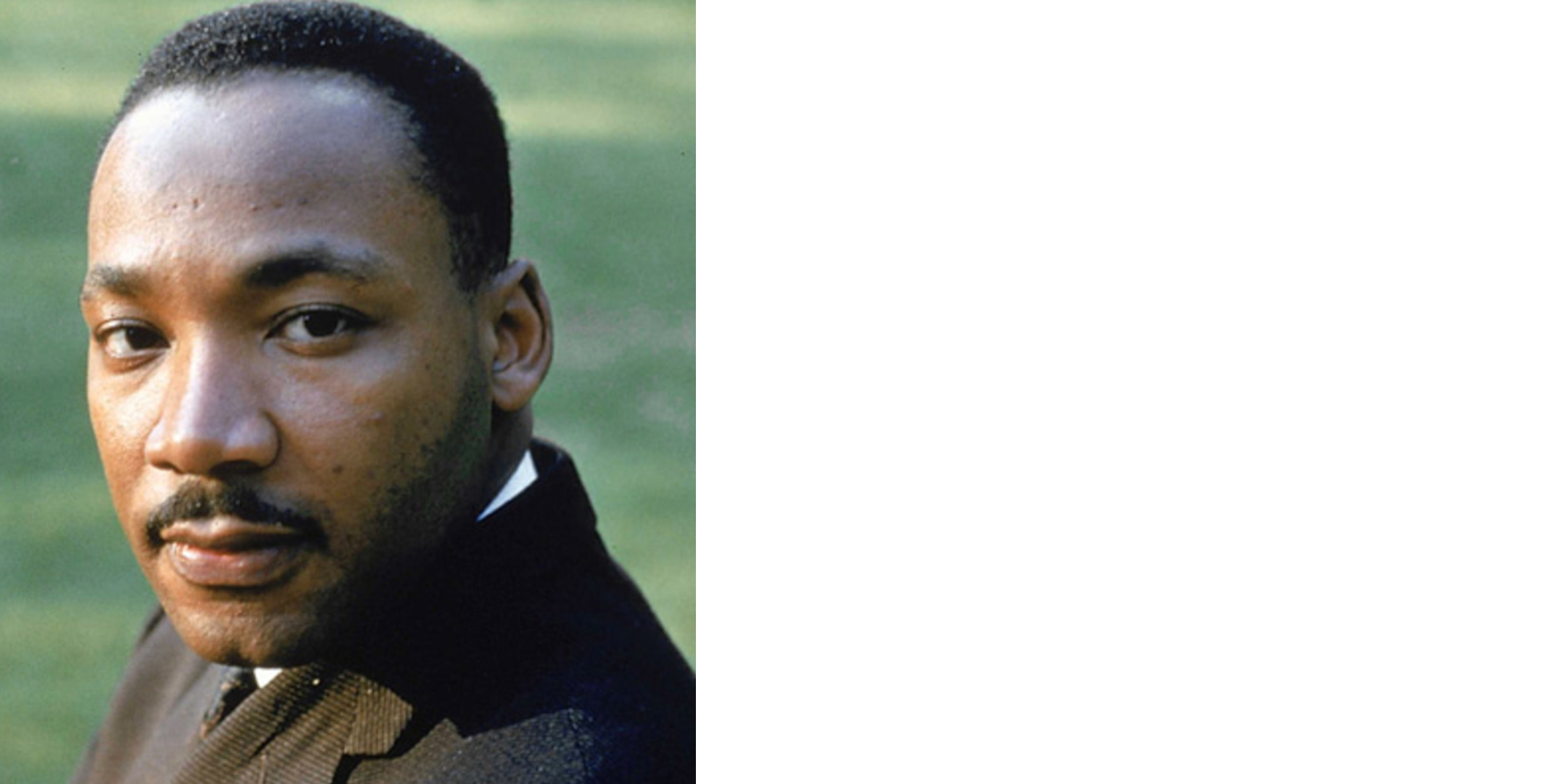
Martin Luther King Jr.
“The arc of the moral universe is long, but it bends toward justice.” — Martin Luther King Jr.
But the state of the world makes it clear we are not there yet. The moral arc has moved toward more and more true freedom for more and more real people, but as millions of Americans can attest, that doesn’t mean we have arrived at real justice!
SO WHAT DO WE DO?
This is where the inquiry gets most challenging. While it is clearly irrational to expect Socialism in America to lead anywhere but where it has led in every country throughout history, the disparity of access to health care and education and money and the increasing sense of desperation inspire all of us to want to “do something!” I believe what is called for is a deep understanding of the nature of the problem and our ultimate goal, and then for each of us to do what is right for us in transitioning to that goal — without creating any new violations.
I have found it to be of profound value to ask myself and others, “What, if any, justifications do you have for any person to violate the person, property or privacy of another, except in defending oneself?” Though the reasons given are usually well intended, it is both rational and demonstrated that violation can never be an effective foundation from which to achieve justice. It is both unethical and illogical to use the threat of violence to require people to fund the authorities to rule them against their will. The hidden virus is this…that the whole notion of a “regime” is corrupt from the start.
“Absolute power corrupts absolutely.” — Lord Acton
“The problem is not just the abuse of power…it’s the power to abuse.” — Stefan Molyneux
Yet most people can’t imagine doing without a regime. And nearly everything about our lives is enmeshed in the current government regime. In THRIVE we laid out three overlapping stages to further the “arc bending toward greater justice” that M. L. King recognized. Clearly, we aren’t going to snap our fingers and arrive at our destination: what we call Stage 3, a world where no one has rights that all people don’t share, where trade is voluntary, individuals are 100% accountable for their actions and are prosecuted for polluting the environment and resources on which all people depend, where private, voluntary exchange is not a means to empower the wealthy but rather the natural outcome of people all having unfettered access to the fruits of their labors, where there are rules but no rulers, where all laws are protective and the one overarching right each person has is the guarantee not to be violated against their will.
But that is not to say this shouldn’t be our goal. Indeed, I believe any goal short of this will lead to a repeat of the history that has so marred our human evolution and could lead to the extinction of our species. So, how do we get there?
Keeping the goal of true freedom in mind, our recommended transition strategy involves taking the best of various perspectives in a way that empowers people to have increasing access to the tools by which to exercise and expand their liberty. If we were sailing out of San Francisco toward Hawaii, we would be tacking to port and starboard, but without clarity about our destination and the principles by which to navigate, we would likely get lost and perish on the way.
In Stage 1, those most damaged by our current corruption would be “liberally” assisted with support, housing and healthcare — but from cuts in the military budget and war spending and the elimination of the Federal Reserve, not from new taxes. In Stage 2, we would be shrinking the government “conservatively” to the protection of individual rights and the commons.
Weaning responsibly from a system of corruption and coerced dependency, these phases can emerge naturally, without violence, as people wake up to realize that what is moral is also what works.
For any hope of closing the wealth gap, we need, for example, to get the monopoly on creating money away from the Federal Reserve. This is where the work of Ellen Brown offers a transition strategy. It cancels the national debt and restores control of currency to the Treasury and creates public State Banks like the successful one in North Dakota. Ultimately, however, banking would need to be an entirely free market enterprise because in our current reality the government and the treasury are controlled by the banking and corporate elite.
And as for the notion of having any kind of true representation of people by government, the order of first priority needs to be to get rid of the corporate right to personhood. Otherwise Sanders and the others can talk all they want, but the truth is the government’s function is simply to provide the enforcement arm of the corporate will at the expense of people and the planet. Efforts like Move to Amend provide a start. Robert Hinkley also has done a lot of thinking and strategizing toward this end with his Time to Change Corporations: Closing the Citizenship Gap (paid link).
For those of us, like me, who do not look to coercive governments of any denomination to solve our problems, and who are unwilling to empower them with our belief or vote, our greatest contribution is working to empower grassroots efforts to create healthy, whole-system alternatives to what governments are traditionally called upon to provide — like alternative currencies, eco-communities, free energy, preventive and natural healthcare, organic polyculture farming, and so on. In addition, it is immensely valuable to immerse in the rational thinking that underlies the goal of true liberty so that we understand personally and unequivocally that we all have the intrinsic and absolute right to self determination and self expression so long as we do not violate anyone against their will in the process. POLITICS is based on COERCION, and as such is intrinsically repressive in the name of assuring stability.
Politics
"activities that relate to influencing the actions and policies of a government or getting and keeping power in a government."
(Merriam-Webster)
Coercion
"force or the power to use force in gaining compliance, as by a government or police force."
(dictionary.com)
The entire “political spectrum” is actually an assortment of approaches to ruling people by coercion. That’s the set, the category of thinking. Many healthy values are shared. Most people, including politicians, do want everyone to thrive — to have enough to eat, to be healthy, to be well educated and informed, and to be prosperous and secure. But a deep fog of anti-critical thinking seems to roll in — just when we need to consider whether or not their suggested “solutions” are just and effective.
The entire “political spectrum” is actually an assortment of approaches to ruling people by coercion.
To be truly just, fair and mutually successful in their dealings with one another, humans must lift off the plane of force and domination, and move above the category of coercion by rulers, into the voluntary interactions that are the hallmark of true liberty.
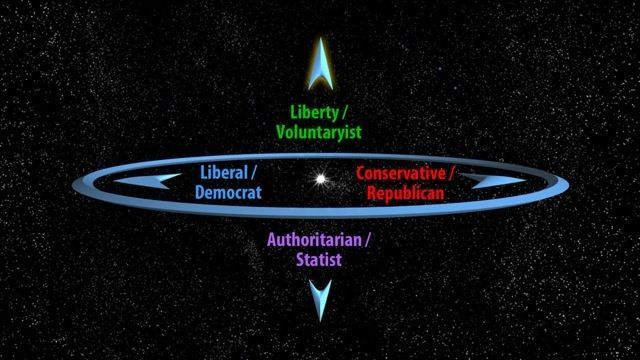
Thrive’s version of the Nolan Diagram
How can we have a peaceful, productive, society with rules but without rulers? We must think newly, as Einstein reminded us, because problems don’t get solved at the level of thinking that created them. And that’s where new concepts are needed.
Libertarian
A person who advocates liberty, especially with regard to thought or conduct; a person who maintains the doctrine of free will
(dictionary.com)
It is critical to distinguish between a “capital L” Libertarian which has become a political party that advocates for small government with them in charge, and the actual philosophical definition above which would not condone any centralization of power over others. A thorough “libertarian” would be a “voluntaryist” or “anarchist.” (See below)
Anarchism
"A doctrine urging the abolition of government or governmental restraint as the indispensable condition for full social and political liberty."
(dictionary.com)
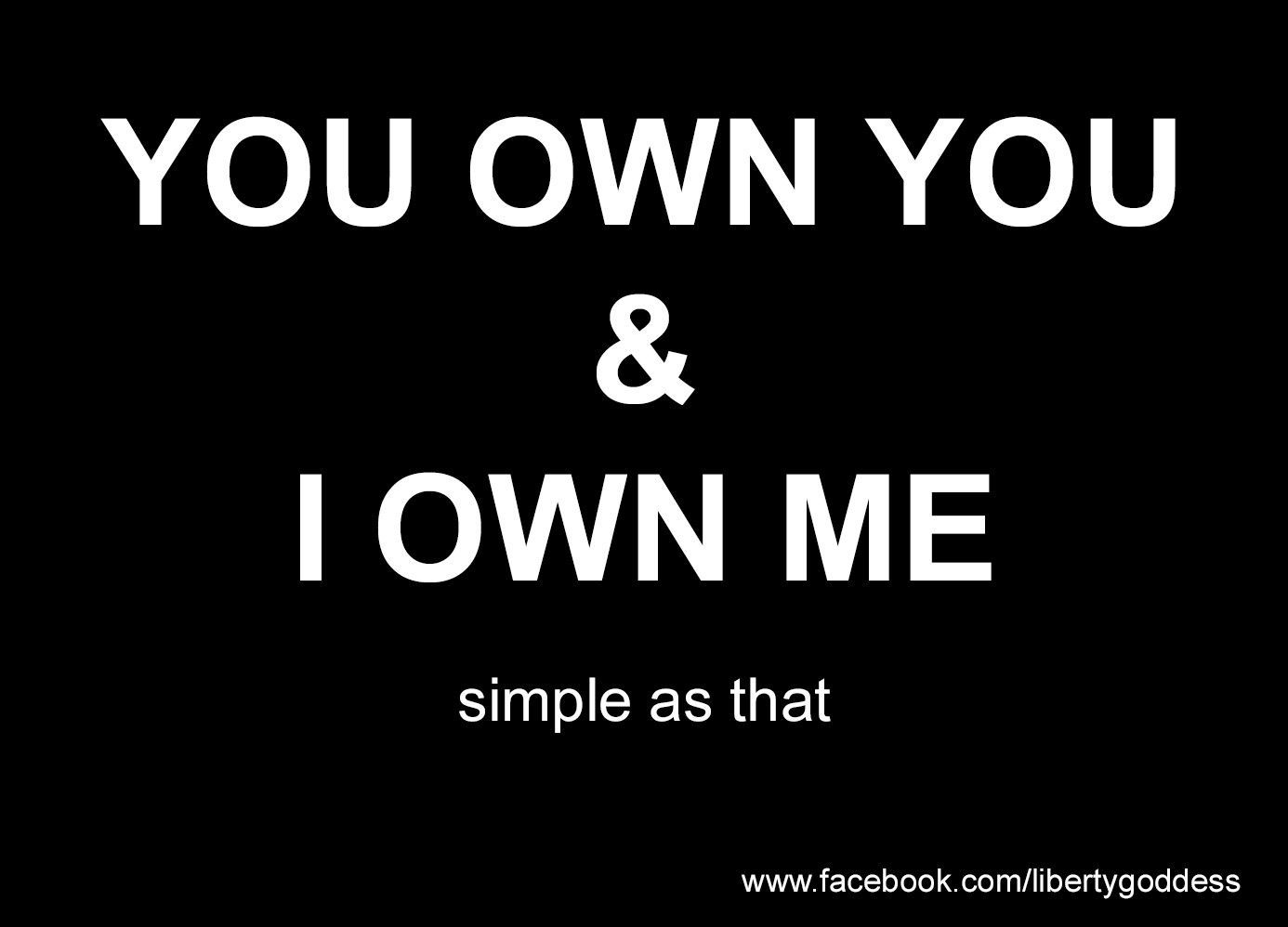
The true meaning of anarchy is simply “without rulers.” We have been trained to think of it as utter chaos and violence, and indeed some sources even give that as an alternative definition. But there are countless ways to protect against violence without giving a monopoly on force to one group. It is only because a group has controlled our access to money, education, and all portals for thriving for so long that we often can’t even envision what would happen if they didn’t.
It is only because a group has controlled our access to money, education, and all portals for thriving for so long that we often can’t even envision what would happen if they didn’t.
What if we all had the money to help and create that we currently pay to the government to do for us? I am convinced that we could do better than the woeful state of affairs those “in charge” have corrupted us into. Is this just because they happen to be greedy and it would all work out if we just had more enlightened versions of controllers? Given that every single form of government has led toward tyranny, I would say we better consider that as soon as one group is given power not all people have; the disease is in the system. It is just a matter of time.
Minarchism
Dictionaries do not yet have this word included, but it is more and more commonly used to connote a society with a “minimal” government — intended only for the protection of individual rights.
Voluntaryism
Dictionaries do not yet have this word included either, but it is used in philosophical and freedom activist circles to refer to a condition of society that honors individual rights (including private property), voluntary exchange and does not recognize anyone’s right to rule over another against their will, or to initiate force except in true self defense. According to these criteria, no form of mandatory government (the ‘state’) would be allowed, but there could, of course, be businesses, clubs, associations, conflict resolution organizations, security organizations, insurance companies, etc. in which membership would always be voluntary. They would all be competing for clients by earning a reputation for integrity, reliability and efficiency. Violators would be prosecuted and shunned.
This condition is sometimes referred to as well by the term “anarcho-capitalism” — meaning no rulers and free trade. Few understand the value of this term, however because “anarchy” has been twisted to mistakenly connote lack of accountability, while “capitalism” (see below) has been distorted to mistakenly refer to corrupt, state-intervention, crony “crapitalism.” And as for an outcome of genuine free trade, the destructive subsidized version of corporatism is what people mistakenly think of as “free trade” — and understandably shudder at the thought.

Capitalism
An economic system in which investment in and ownership of the means of production, distribution and exchange of wealth is made and maintained chiefly by private individuals or corporations, especially as contrasted to cooperatively or state-owned means of wealth.
So long as corporations have the rights of “personhood” and are allowed to operate in partnership with government’s monopoly on force and the creation of money, there can be no true capitalism, and no true and wide-spread individual well-being. The term has bad connotations because the current corrupt, destructive reality of unaccountable corporate control has been wrongfully referred to as capitalism.
MORALITY AND EFFICACY
Just as when our ancestors moved beyond slavery and mastered first flight, we don’t have all the answers about how it’s going to work in a “stateless” society, but fundamentally we need to do it because it is morally right and it’s our best shot at truly coming up with a way for all people to have a chance to thrive. Fortunately the evidence is solid that more social and economic freedom leads to more security, prosperity and happiness, and periods throughout history have shown glimpses of the security, creativity and prosperity that arise from strong economic and political freedom: the U.S. in the 1800s (no income tax and no Federal Reserve), Sweden and Denmark in the early 20th century, Shanghai before WWII, Hong Kong and Germany in the latter half of that century, Silicon Valley, etc.
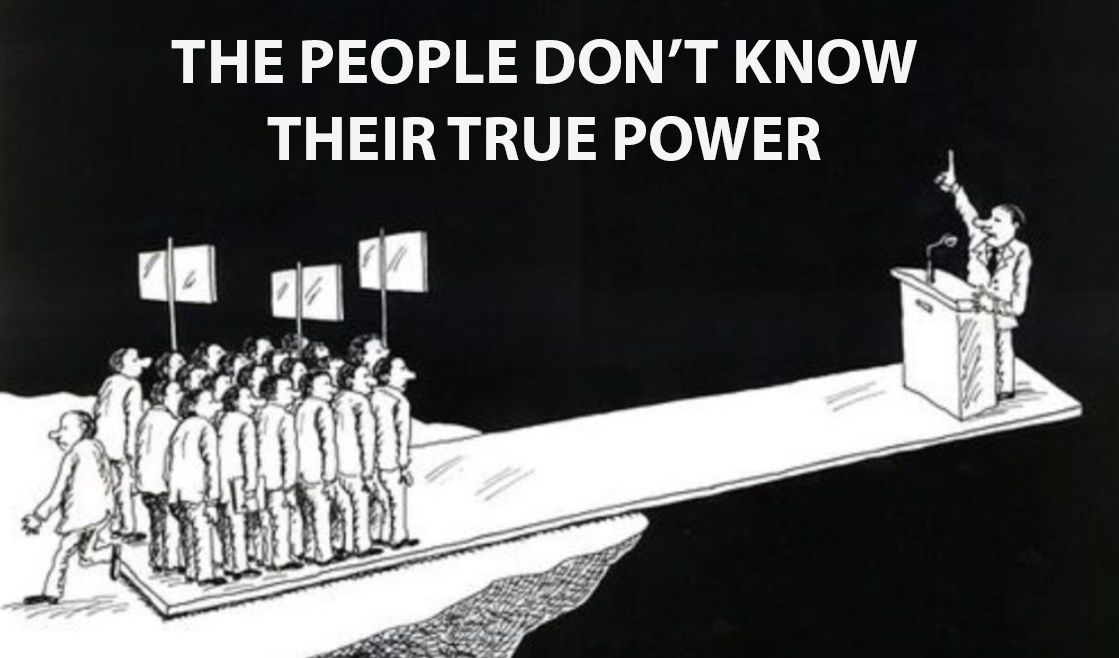
U.S. PRESIDENTIAL CANDIDATES
Seen through the lens of a transition strategy, “bringing as much integrity as possible to current systems and helping those most in need,” on our way to true sovereignty, a lot of Sanders’ platform makes sense: Bernie wants to cancel the Citizens United ruling to move toward campaign finance reform and take the corporate bribery out of politics. He wants to get everyone healthcare. He voted against the Iraq war and against the Cybersecurity Information Sharing Act. He wants to prosecute the fraud of the big banks.
For me the key, again, is in the phrase, “Keep the goal in mind,” so that these types of reforms don’t end up leading ultimately to a huge, socialist/communist totalitarian state as they have in Russia, Germany, China, Viet Nam, Venezuela and so many more. Remember Sanders voted in favor of bombing Serbs over Kosovo and for sending $1 billion to the coup government in Ukraine. He also supports mandatory vaccines and wants to run the income tax rate upward toward 90%.
Dennis Kucinich would have been an ideal Stage 1 politician, in my opinion, but only in the context of temporary reform and relief while shrinking government toward a minarchy protecting rights and commons. It’s hard to picture good old Bernie taking your money at the point of a gun, or jabbing your kids with toxic vaccines, but that is what Socialists pay their enforcers to do — with your money.
Ron Paul would have been a good Stage 2 transition politician with his track record of integrity and his consistent commitment to sound money, limited state intervention in people’s lives and no foreign wars of aggression. His son Rand is a watered down version of this, but in emphasizing politics over principles in going Republican, Rand seems to have lost much of his libertarian base while scaring off many big government Conservatives. He wants to balance the budget, slash spending, repeal the Patriot Act, end large scale data collection, shut down the Department of Education and the TSA, keep vaccinations voluntary and take marriage out of government hands. But then he also wants to raise the defense budget when it already essentially matches the rest of the world’s forces — combined!
Donald Trump has some transition-sounding commitments regarding cutting spending, protecting the right to bear arms, repealing Obama’s socializing of healthcare, freeing up markets, lowering taxes and keeping U.S. troops out of Syria. But with the Federal Reserve intact, and so many people disenfranchised and suffering, he does not include helping those in need as part of his strategy. His bullying, arrogant nature, his desire to show the world how tough and superior he and America are, and his hawkish stance on Iran remind me of other disastrously vicious dictators who were originally democratically voted into power on charisma and populism. Trump opposed the war in Iraq, but now says we should have taken their oil and never left. Once again, were he the new President, it would be critical to keep the goal of true freedom in mind so he could not ride his power into fascism.
With Hillary Clinton or Jeb Bush in the Oval Office, though they appear to be in different parties, we would be assured of having more of the banking cabal’s deceptions, thefts, wars and destruction of the middle class. Hillary holds a wet finger to the wind and goes with the fashionable political leanings on such issues as same sex marriage, immigration and trade deals, but when it comes to banking schemes or imperialist wars, her support is consistent. Jeb wants to impose Common Core on every child, strengthen ties with Israel and send troops to Russia.
Ben Carson is a voice for freedom when he wants to eliminate the IRS, replace Obamacare, increase school choice and not try to take people’s guns away, but then he wants to make vaccinations mandatory, tell people who they can and can’t marry and says the theory of evolution is the work of Satan. This is more of what it looks like when religion and politics guide a man’s ethics rather than the principles of rational, secular freedom that would apply to everyone equally.
Marco Rubio wants to balance the budget and repeal Obamacare and cut taxes, but he seems ready to bully Iran or anyone else and wants a permanent U.S. presence in Iraq.
With the Green Party, we could get some transition advisors, as they seem to have increased environmental awareness, but it’s all about mandates — rather than personal liability, and a single unquestioning belief on climate change rather than an educated exploration of the facts and potential motives (see my blog on this topic.)
With the Libertarian Party, I believe we would get more common sense and true freedom and prosperity than with any of the others but again they don’t adequately address the needs of those most hurt and dependent as we engage in this transition. They are also still caught in the myth of authoritarianism and believe they should be in charge.
Want to spice up your political conversations during the holidays and this next year? Consider discussing:
- When, if ever, is it OK for someone to coerce or violate someone else except in authentic self-defense?
- Is an authoritarian power using coercion necessary in order for humans to be compassionate?
- Can violence ever be a sustainable basis for a peaceful society?
- What ideology do you align with and what is the definition of it? What has it lead to historically?
- What do you propose actually doing, if you were “in charge” and who, if anyone, would get violated in the process?
- Is there any factual evidence that government will actually solve the profound issues facing us today?
- What are some real-life examples of “enlightened leadership,” where it is not coercively imposed?
- If there were a way to have accessible and good roads, education and healthcare, help for the poor, a respected system of justice, etc. — without anyone being violated against their will, including an involuntary income tax — would you want that?
- What are some examples of grassroots efforts that free people from dependence on the government?
In the current system, no one from any but the “big two” parties has a chance of winning the election because of exclusionary funding and debate structures and the fact that the corporations, banks, military and government institutions are committed to the security of knowing any candidate put forth after the primaries is already working for them and can be counted on not to rock the big boats. (Free and Equal works to include more than just the two dominant parties in the political process.)
Republicans seem to want to tell us what we can or can’t do in the bedroom or the boardroom. Democrats seem to want to tell us how the money they take from us will be given to others. Most of the “leadership” from both parties want to protect the Federal Reserve and its fiat money/fractional reserve scam, militarize police forces, protect the medical, pharmaceutical and Big Ag cartels, wage wars, expand the empire, impose global governance and create fake “free trade” agreements (GATT, NAFTA, TPP, TTIP etc.) for the big State-protected and subsidized corporations. Campaign debates don’t go near the banking scam, missing trillions or the vast debt being imposed on generations not yet born. There is a semblance of parties, at least two, but essentially they serve one agenda from higher up the power pyramid.
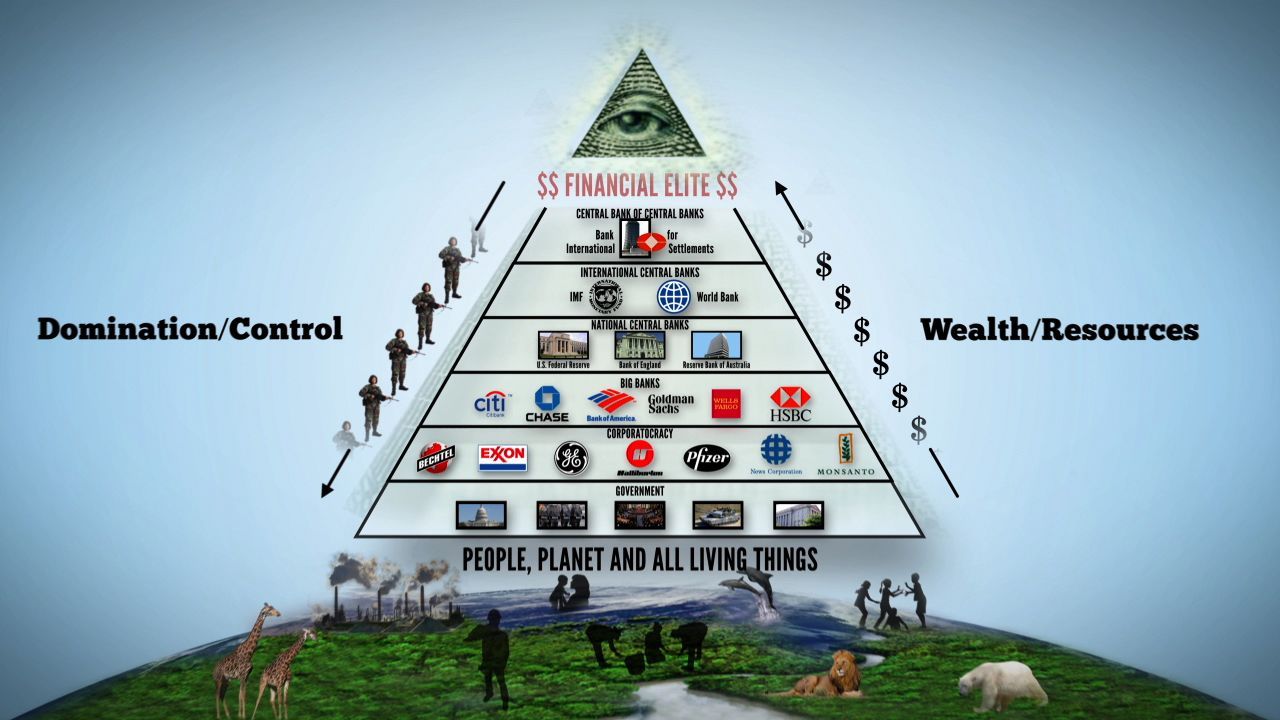
The globalists, in their surge toward a “New World Order” want the benefits of authoritarian domination to go with the benefits of a free market. In China they call it Authoritarian Capitalism or Democratic Dictatorship. Now the Pope is touring the globe with his anti-free market, Agenda 21/2030, one-world government message. They hope to install the unprecedented laws and taxes for the one-world government at the Paris Climate Summit in December 2015 under the guise of curbing climate change. All over the world citizens are being “socialized” in preparation for a one-world socio-communist, totalitarian state, with the money men in charge.
The evidence from the past has shown consistent failure of this approach and, for all its humanitarian sounding goals, the coercive means of forcing re-distribution of wealth is morally bankrupt, but still the U.S. and much of the world careen toward totalitarianism.
The one thing I have found that everyone agrees on is that they don’t want to be violated against their will. That’s the Non-Aggression Principle, and it is the operating compass for the three stage solution strategy we outlined on our website and in THRIVE. It is the core understanding and practice that I believe is truly capable of empowering a sustainable and thriving civilization.
I am convinced that, if we are going to survive and thrive, we need to abandon the use of violence (except in self defense) as the means to get to peace, and as the foundation of our so-called civilization. It’s fundamentally immoral and it doesn’t work.
Calling the initiation of force by sweet sounding names like socialism, republic, democracy, liberal, conservative, majority or any other, doesn’t change the harsh reality that with any of this people are relinquishing their power, their hard won freedom and their right not to be violated and demanding that others do the same. In this era of suitcase bombs, and biological/chemical weapons by which a small group of oppressed people can take vengeance on a whole city or country, we have to figure out a new way. At least knowing what we are talking about is a sound start.
REFERENCES
Those unfamiliar with the transition path to freedom and prosperity I am describing can look at the “Creating Solutions” chapter (1:38:40) of our film, THRIVE: What On Earth Will It Take? and immerse in the following articles from our website:
How would we ever be able to get to a truly just and free society from where we are now? We address non-coercive strategies and tactics for that transition in each Sector of human endeavor on our website.
